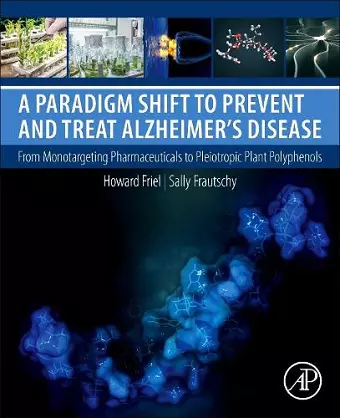A Paradigm Shift to Prevent and Treat Alzheimer's Disease
From Monotargeting Pharmaceuticals to Pleiotropic Plant Polyphenols
Howard Friel author Sally A Frautschy author
Format:Paperback
Publisher:Elsevier Science Publishing Co Inc
Published:19th Jul '17
Currently unavailable, and unfortunately no date known when it will be back

Compiles the prevention and treatment aspects of biologically active polyphenolic compounds in common foods and their effect on Alzheimer's disease
A Paradigm Shift to Prevent and Treat Alzheimer’s Disease: From Monotargeting Pharmaceuticals to Pleiotropic Plant Polyphenols is the first book to systematically exhibit the powerful pleiotropic pharmacological effects on Alzheimer’s disease of plant-based compounds from ancient foods that humans have been consuming safely with substantial health benefits for thousands of years. These plant-based compounds include curcuminoids from turmeric, resveratrol from red wine and grape seed extract from other grape products, epigallocatechin-gallate (EGCG) from green tea, and oleocanthal and oleuropein from olive oil, in addition to a special extract, EGb 761, from the leaves of Ginkgo biloba, the oldest living species of tree on earth. This book also presents a new analytical framework that convincingly favors a multi-targeting ("pleiotropic") approach to the prevention and treatment of complex chronic diseases, in contrast to the mono-targeting of the pharmaceutical model. A Paradigm Shift to Prevent and Treat Alzheimer’s Disease is a unique and exciting resource for pharmaceutical scientists, pharmacologists, neurologists, general practitioners, research scientists in various medical and life sciences, healthcare professionals in clinical and executive positions, conventional medical schools, schools of naturopathic medicine, healthcare and medical journalists, executives in both national public healthcare systems and private insurers, and informed general readers.
"This is a wonderful book for people who are looking for ways by which we will overcome Alzheimer's disease, the most common dementing disorder affecting middle-aged and old people. On understanding of the pathophysiology of Alzheimer's disease, the authors clearly explain and discuss multiple ("pleiotropic") effects of plant polyphenols on Alzheimer's disease from multiple viewpoints, including epidemiology, sequential events in the brain that lead to disease initiation and progression, and current status of human trials with polyphenols. Plant polyphenols that have effects on the multiple pathomechanisms of Alzheimer's disease are expected to prevent or delay the disease onset and progression safely, effectively, and inexpensively. We need further studies to establish this." --Masahito Yamada is Professor and Chair, Department of Neurology and Neurobiology of Aging, Kanazawa University Graduate School of Medical Sciences "This timely book by Howard Friel and Sally Frautschy provides an in-depth discussion of an approach to the treatment of Alzheimer's disease (AD) that is very distinct from the one that has been taken by the pharmaceutical industry. Since none of the drug candidates promoted by the pharmaceutical industry for AD treatment over the past 20 years have succeeded in the clinic, alternative approaches are desperately needed. This book should be of great interest to clinicians/health care workers and research scientists as well as the informed layperson. For clinicians/health care workers, the book provides a potential road map for the treatment of patients ranging from those with only very mild cognitive problems to cases of more severe memory impairment. Since there are currently no effective treatments for AD, this road map could give new hope to patients and their care providers. For the research scientist outside the AD field, the book provides an excellent, thoroughly referenced introduction to AD. And, for the AD scientist, the book suggests new avenues of research. Finally, for the informed lay person, the book identifies safe approaches for the prevention of this devastating disease. Thus, this volume makes a significant and much needed contribution to the AD field and should be highly appreciated by many." --Pamela Maher is a Senior Staff Scientist in Cellular Neurobiology at the Salk Institute for Biological Studies in La Jolla, California "This book from Friel and Frautschy rigorously supports the thesis that multi-mechanistic, non-toxic, polyphenolic compounds found in the ancient foods of tea, turmeric, olive oil, and red wine are superior to mono-targeting pharmaceuticals for the prevention and treatment of numerous chronic diseases in humans, in this case Alzheimer’s disease." --Navindra P. Seeram, Associate Professor in the Department of Biomedical and Pharmaceutical Sciences, Botanical Research Laboratory, College of Pharmacy, University of Rhode Island.
ISBN: 9780128122594
Dimensions: unknown
Weight: 520g
290 pages